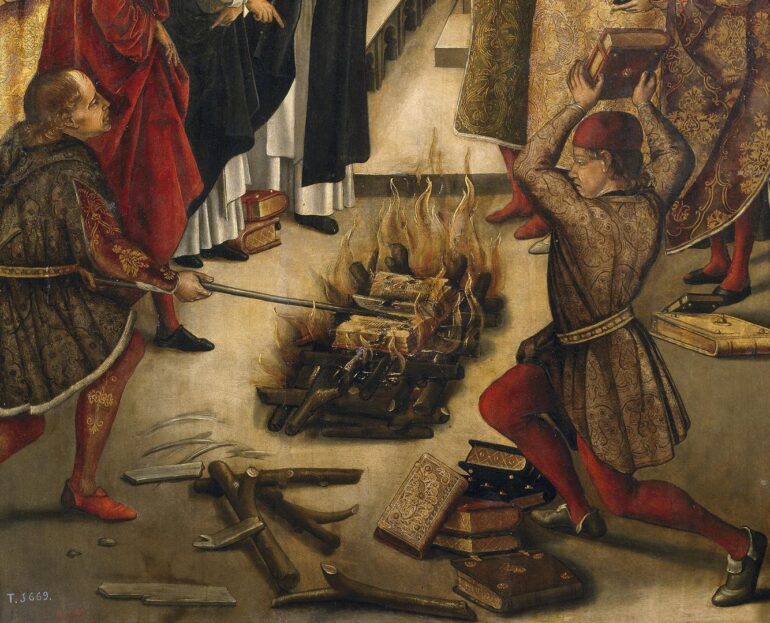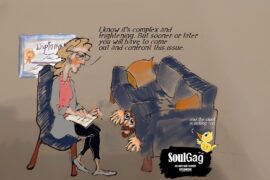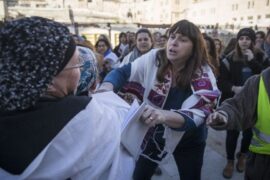The cathedral of Notre Dame, one of the most famous historical edifices of Europe, went up in flames on Monday. Though not the first fire to damage the building, it is by far the greatest threat since World War II to this historic landmark.
The world has reacted with utter shock at this destruction. Hundreds of millions of euros have been pledged to aid in reconstruction efforts. As a symbol of Europe’s greatness, as well as its deeply Christian heritage, Notre Dame is close to the hearts of millions around the world. Even outside of Christian and European circles, the cathedral is a cornerstone in any canon of European art, statuary, and architecture.
Yet the legacy of Notre Dame, like so much of European history, is a complicated one where Jews are concerned. It was evident from internet conspiracies which abounded in the aftermath of the conflagration blaming Muslim immigrants and Jewish banking cabals that Notre Dame, and the pinnacle of Christian European civilization that it represents, holds a darker underbelly.
The history of Notre Dame is inextricably tied with the history of the Jews of France. During its construction, beginning in 1163, the French King Philip Augustus expelled the Jews from the country in 1182, a culmination of rising Jew hatred that fermented throughout the early crusading era.
And, famously, in 1240, as finishing touches were being conducted on many central parts of the cathedral, King Louis IX summoned a group of rabbis to defend the Talmud against the accusations of converted Jew Nicholas Donin.
Inevitably, Pope Gregory IX, who presided over the disputation, judged in favor of Donin, and called for the burning of thousands of handwritten manuscripts of the Talmud in the square just across the Seine from the rising cathedral. The masons likely witnessed the billowing smoke as they plied their craft.
Also at the scene of the conflagration, one of the defending rabbis, Me’ir of Rothenburg – the Maharam – wrote in his horror and anger, “since you decree to burn our law with fire and with ridicule, praiseworthy will be He who rewards your deeds in kind.”
Jews throughout the world have been reciting this verse of vengeance ever since, each year on the date when we recall the destruction of our civilization at Roman hands – an event that led to a long dark period of exile that was especially torturous for those Jews living under Christian rule.
But we must be careful not to jump to conclusions about divine justice or karmic energy. As Rabbi Shlomo Aviner of Beit El, born and raised in France, responded in a recent interview about the Notre Dame fire, “we cannot know the secrets of HaShem, for that we require prophets… Christianity does deserve retribution – they constitute our greatest adversaries throughout history… Nevertheless, we cannot understand the secrets of HaShem, and the reasons that sometimes there is good and sometimes bad.”
The deep and pure humility of Rav Aviner shines brightly through his statement; in our day and age, it is all too easy to proclaim every bit of bad mazal for Christians as divine retribution for centuries of torment.
When we take a step back, we cannot say that Jews haven’t faced our fair share of destructive fires, and tragedies in recent years as well. It is truly arrogant to claim that we understand the depths of divine justice at work in the world when we are so distant from a prophetic connection with the source of that justice.
One cannot deny the deep and complex emotional reactions of Jews to a flaming Notre Dame. It is interesting that the statues of Ecclesia and Synagoga – a medieval visual metaphor for the triumphant glory of Christianity and the decrepit tragedy of Judaism in Medieval France that adorns the facade of the cathedral – were off site for restoration at the time of the fire. But to approach these events with declarations rather than examinations, with answers rather than questions, especially in Nisan, the season for asking questions about our exile and our redemption, is not the Jewish way.
As demonstrated in the parallel blessings upon hearing good and bad news, the answers lie beyond us. We acknowledge both that HaShem is “good and does good – hatov ve’hametiv,” and also “the judge of truth – dayan ha’emet.” That which we perceive as good, and that which we perceive as bad, are both the true, benevolent justice of a power which exists above and beyond our comprehension.
As we enter Pesaḥ, we must remember that the forces of our liberation and redemption remain a mystery that we must continue to explore and question, with curiosity, with humility, and with emuna in the ultimate goodness of the one true Judge.





